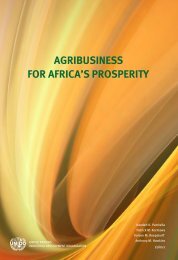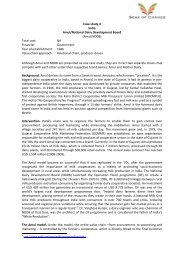PRODAP-II has supported the participation <strong>of</strong> producers and organizations in 30 trade fairs organized across thecountry and it has also facilitated the development and dissemination <strong>of</strong> monthly bulletins on prices and markets.About 80 newsletters have been delivered monthly to the organizations for the dissemination <strong>of</strong> informationamong members.3. Impact and Evolution <strong>of</strong> the initiativeImpact on target group. The producers have gained access to dynamic markets for selling their products atcompetitive prices, also thanks to the construction and rehabilitation <strong>of</strong> roads and to the support provided by theproject in marketing.The case <strong>of</strong> ACOPANELA.ACOPANELA is a cooperative <strong>of</strong> producers <strong>of</strong> dulce de panela, that makes and sells brown and granulated(refined) sugar. It provides services to its members in terms <strong>of</strong> agro-industrial production, supply, marketing,savings and credit. It began operating in 2004, with 17 members with the goal <strong>of</strong> developing productsdistinguished for their ethnic characteristics and high quality. With the support <strong>of</strong> the Ministry <strong>of</strong> Agriculture andPRODAP ACOPANELA has managed to reach a nostalgic market in U.S. cities with high immigration from ElSalvador. This involved improving the product in several ways: standardization <strong>of</strong> size and weight, colour andconsistency, quality <strong>of</strong> wrapping, and safety to health (hygiene, etc.). Technical assistance from PRODAP II onthe technical aspects <strong>of</strong> production (organic farming practices), processing and management <strong>of</strong> marketingoperations, was decisive for ACOPANELA to learn, inter alia, how to conduct market research, design andconduct surveys, develop a directory <strong>of</strong> potential buyers and improve its bargaining power. ACOPANELA isselling its products to the export market under the “La Molienda” brand.4. What are the key implications for scaling inclusive business?Key featuresEffective governance. The project has adopted a participatory approach, whereby farmers’ organizationsplayed a lead role in requesting specific investments and provision <strong>of</strong> technical assistance services (provided byEmpresas Prestadoras de Servicios).Coordinated delivery <strong>of</strong> services. The intervention provided financial services, technology transfer, technicalassistance and capacity building.Value added/Vertical integration. The producers’ organizations were involved in the whole process <strong>of</strong>designing strategies and plans for improving market access. PRODAP-II financed the construction <strong>of</strong> 939warehouses with a view to reducing post-harvest losses and at the same time allow product aggregation, therebyincreasing the value <strong>of</strong> production. ACOPANELA is selling its products in the U.S. market under a brand (‘LaMolienda’).Information flow. PRODAP-II facilitated the development and dissemination <strong>of</strong> 80 bulletins on prices andmarkets, on a monthly basis.Trust. The organization <strong>of</strong> workshops and the dissemination <strong>of</strong> price and market information have contributed toincrease the level <strong>of</strong> trust and transparency among stakeholders.Horizontal integration. The project has supported the formation and strengthening <strong>of</strong> producers’ associationsand organizations. Producers' organizations have improved their managerial skills, allowing them to takeresponsibility for providing technical assistance to their members, partners and other organizations, to managetheir collaborations with other entities and to venture into more complex production initiatives (i.e. the orangejuice factory in the case <strong>of</strong> APPES and granulated sugar in the case <strong>of</strong> ACOPANELA).Provision <strong>of</strong> credit. 5,363 loans were disbursed to finance agricultural diversification, agro-industrial activitiesand <strong>of</strong>f-farm activities; these loans have benefited 3,398 producers, 24% <strong>of</strong> them women.51
Diversification. Agricultural diversification was encouraged, through the provision <strong>of</strong> specific lines <strong>of</strong> credit andfocussed (demand-driven) technical assistance. This has promoted diversification into other activities (i.e. grains,horticulture, fruits, fisheries and livestock). Thanks to the provision <strong>of</strong> seeds, farmer households are growing newcrops like pineapple, tomato, watermelon.Capacity building. The provision <strong>of</strong> capacity building was included in response to direct demand by thebeneficiaries. Training <strong>of</strong> farmers’ organizations in how to enhance managerial skills and planning capabilitieshave resulted in the formulation <strong>of</strong> sound investment plans.Environment. PRODAP-II made provisions for promoting the sustainable management <strong>of</strong> natural resources.Environmental initiatives including soil conservation were promoted and incorporated into the trainingprogrammes for farmers, in schools and at municipal level. The project co-financed, through FISP, specificactivities related to the sustainable management <strong>of</strong> natural resources; and it has supported the establishment <strong>of</strong>91 greenhouses.Infrastructure. The project has facilitated the purchase <strong>of</strong> 33 irrigation systems benefiting 403 households.Chain efficiency/Competitiveness. Producers are placing their products at competitive prices in marketswhere the demand was once unsatisfied (as in the case <strong>of</strong> ACOPANELA).Inputs. Seeds are provided free <strong>of</strong> charge to the most vulnerable households to improve productivity. Seedswere also provided to encourage households to diversify production.Technology transfer. The project provided training aimed at improving farming techniques.Market linkages. Participation at fairs and workshops were supported, allowing beneficiaries to establishmarket linkages.Sustainability. Establishment <strong>of</strong> linkages with cooperating agencies, government institutions and employersfrom the private sector, together with support from the project or through self-management, has been veryimportant and has contributed to the activities’ sustainability.Sources:• República de El Salvador, Proyecto de Desarrollo Rural en la Región Central/PRODAP II (no. 508-sv), Informe deTerminación del Proyecto, IFAD 2009.• Diaz, O., Escobar, G., “Productores Rurales. La busqueda de mercados formales”, RIMISP 2010.52







